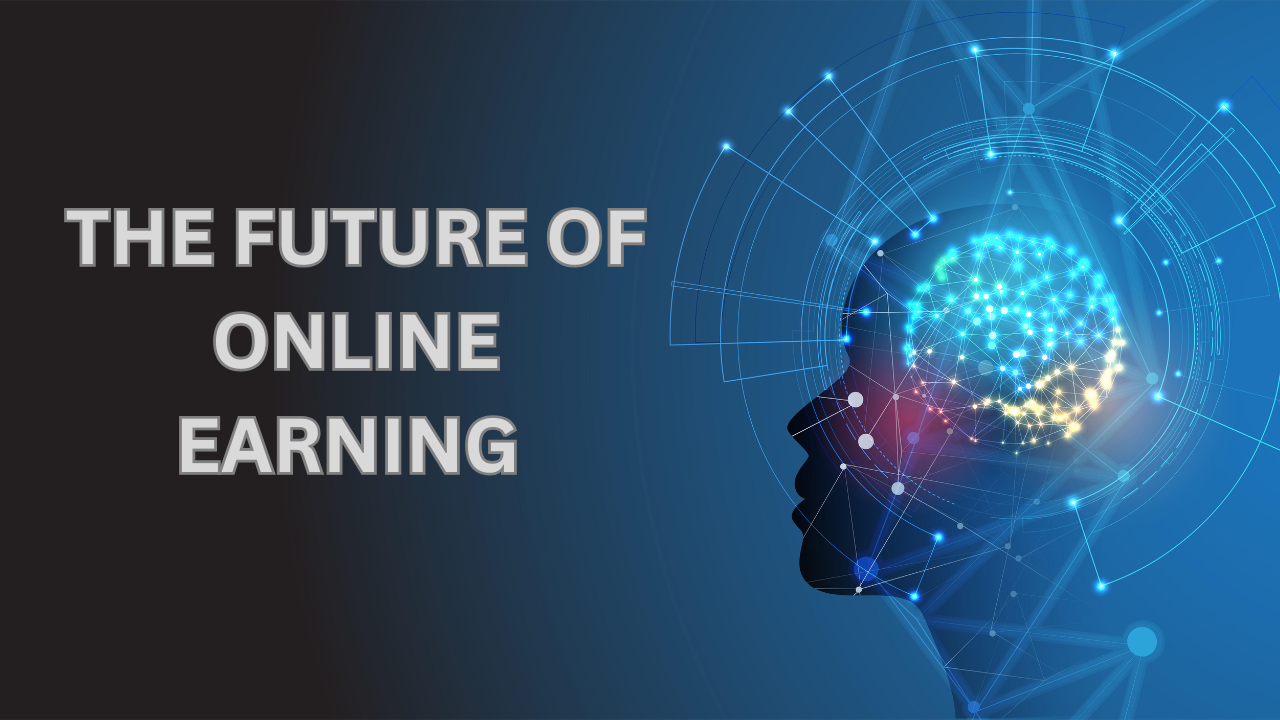The future of online earning is expanding rapidly, driven by technological advancements, the rise of remote work, and an increasing preference for digital services. Opportunities have diversified beyond traditional freelancing to include emerging fields such as content creation, e-commerce, virtual consultations, and blockchain-based revenue streams like NFTs and cryptocurrencies.
Platforms and marketplaces are now more accessible than ever, individuals from all backgrounds can tap into global audiences and clients, creating a more democratized landscape of income generation. Innovations like artificial intelligence, augmented reality, and automation promise to reshape how people earn online, introducing new fields and making it easier to scale digital businesses.
Trends Shaping the Future of Online Earning:
Several key trends are shaping the future of online earning, each opening new avenues and transforming the digital economy. The creator economy is booming, with content creators leveraging social media, streaming platforms, and subscription services like to monetize their brands. E-commerce continues to expand as more individuals set up online stores or participate in drop shipping, aided by user-friendly platforms like Shopify and Etsy.
The rise of the gig economy, with platforms such as Fiverr and Upwork, enables freelancers to connect with clients globally and work across various fields, from graphic design to digital marketing. Additionally, blockchain technology is creating new revenue opportunities through decentralized finance (DEFI), NFTs, and cryptocurrency trading, allowing for peer-to-peer transactions and asset ownership without traditional intermediaries.
Emerging Opportunities:
Emerging opportunities in online earning are increasingly shaped by advancements in technology and the evolving digital ecosystem. The growing popularity of Web3 and blockchain has introduced new ways to monetize through decentralized applications, enabling creators and developers to earn from NFTs, decentralized finance (DEFI), and play-to-earn games.
Artificial intelligence (AI) tools, like generative design and automation software, are empowering freelancers and entrepreneurs to streamline workflows, produce content at scale, and offer unique AI-driven services. Virtual reality (VR) and augmented reality (AR) are creating fresh revenue streams in areas such as virtual real estate, VR-based events, and immersive digital experiences.
Online education is also expanding, with platforms like Udemy, Teachable, and Coursera enabling individuals to turn their expertise into income by developing and selling courses. Social commerce, fueled by live streaming and shoppable content, allows influencers and entrepreneurs to monetize directly through social media platforms.
Skills for Future Online Earnings:
As the landscape of online earning continues to evolve, certain skills are becoming increasingly essential for success in the digital economy. Proficiency in digital marketing is crucial, as businesses seek to enhance their online presence and engage audiences through social media, search engine optimization (SEO), and content marketing strategies.
Technical skills, including coding, data analysis, and familiarity with emerging technologies like blockchain and AI, are highly valued, enabling individuals to navigate and innovate within digital platforms. Creative skills, such as graphic design, video production, and content creation, remain in demand as brands look for unique ways to connect with consumers.
Additionally, strong communication and networking abilities are vital for building relationships and establishing a personal brand, particularly in the gig economy and creator space. Finally, adaptability and a willingness to learn are essential, as rapid technological advancements and shifting market trends require individuals to continuously.
Platforms and Tools:
The proliferation of platforms and tools designed for online earning has transformed how individuals and businesses operate in the digital economy. E-commerce platforms like Shopify, Wo Commerce, and Etsy empower entrepreneurs to set up and manage online stores with ease, enabling them to reach global audiences.
Freelancing websites such as Upwork, Fiverr, and Freelancer facilitate connections between skilled professionals and clients seeking various services, from writing and graphic design to programming and digital marketing. Content creators benefit from platforms like YouTube, Twitch, and which allow them to monetize their work through ad revenue, subscriptions, and direct fan support.
Additionally, social media platforms like Instagram, TikTok, and Facebook have integrated shopping features that enable influencers and brands to sell products directly to their followers. Tools for project management, collaboration, and communication, such as Trello, Slack, and Zoom, enhance productivity and facilitate remote work.
Future Predictions:
Looking ahead, the future of online earning is poised for significant transformation, driven by ongoing technological advancements and shifting consumer behaviors. One key prediction is the rise of hyper-personalization, where businesses leverage data analytics and AI to create tailored experiences that cater to individual preferences, enhancing customer engagement and loyalty.
The creator economy is expected to expand further, with more individuals monetizing their passions through diverse channels, including live streaming, podcasting, and virtual events. Remote work is likely to become even more entrenched, leading to a greater emphasis on flexible work arrangements and a global talent pool, enabling companies to access skills from anywhere in the world.
As blockchain technology matures, decentralized platforms may emerge, offering creators more control over their intellectual property and revenue streams. Additionally, the integration of augmented reality (AR) and virtual reality (VR) in online commerce and training could create immersive earning opportunities that redefine consumer interactions.
Challenges and Limitations:
Despite the exciting opportunities in online earning, several challenges and limitations persist that can hinder success. One significant challenge is the oversaturation of certain markets, particularly in freelancing and content creation, where competition can be intense and it may be difficult for individuals to stand out.
Additionally, reliance on digital platforms introduces vulnerabilities, as changes in algorithms, platform policies, or even account suspensions can drastically affect income streams. Many individuals also face barriers to entry, such as limited access to technology, high-speed internet, or the skills necessary to navigate complex digital tools and platforms.
